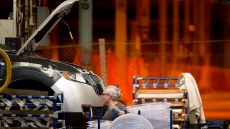VICTORIA - The issue of a liquefied natural gas tax is set to heat up debate during British Columbia's fall legislative session, but the potentially controversial issue of emissions controls on LNG are also part of the package.
Finance Minister Mike de Jong said the Liberal government plans to introduce two separate pieces of legislation focusing on LNG — covering taxes and emissions reporting.
De Jong said the tax legislation will be tabled within the next two weeks and the emissions reporting bill is due in late October.
British Columbia's politicians return to the legislature Monday for the legislative session scheduled to last until Nov. 27.
De Jong said the primary focus of the session will be the introduction and debate of the proposed LNG laws, of which a template of a proposed two-tier tax was introduced in last February's budget.
Premier Christy Clark bills the development of an LNG export industry as having the potential to generate a trillion-dollar economic opportunity that could create up to 100,000 jobs. She promised to devote royalties from the industry to create a prosperity fund that would fuel projects and wipe out the province's debt, currently at more than $60 billion.
There are more than a dozen LNG projects in the proposal stages in B.C., but the companies have yet to make their final decisions on investment.
Several major companies, including Malaysian energy giant Petronas, which is part of a multi-billion-dollar LNG proposal near Prince Rupert, have said they need to see the government's taxation plan.
Clark met with Petronas chief executive officer Shamsul Abbas on Tuesday, with officials describing the meeting as "cordial."
"These are sizable investments with a lot at stake for the citizens of B.C., and the proponents and we want to get it right," de Jong said in an interview.
He would not discuss actual tax numbers, saying that will come within weeks. But de Jong said much of the negotiations have been around finding a figure that is good for the industry and one that provides benefits to the province.
"There's certainly been discussion around the overall cost structure," he said. "We want to be competitive as a jurisdiction so these proponents are able to make these sizable investments. We're also mindful of who owns the resource that lies at the heart of this process. That's the citizens of B.C. They deserve a fair return as well."
De Jong said there have been ongoing consultations between the government and the industry about the proposed legislative package.
He said public comments by some industry officials that they are concerned with the amount of tax the government is seeking have not harmed the behind-the-scenes negotiations. De Jong said calls by industry for tax relief are expected.
"If you ask a proponent what level of taxation they would like to pay, the most honest among them would say zero," de Jong said. "Folks are going to advocate in the best interests of the organization they represent. The organization we represent is the taxpayers of British Columbia."
De Jong said that an emissions-reporting scheme would also be legislated, but he refused to elaborate.
The Environment Ministry said in a statement that the "government is working to ensure any LNG facilities built in B.C. are the cleanest in the world. The province plans to bring legislation forward in the fall to make this a reality."
In July, Clark told an international conference at Whistler that selling LNG from B.C. to China will reduce greenhouse gas pollution worldwide because it will lessen China's dependence on coal as an energy source.
She said she remains committed to meeting B.C.’s legislated greenhouse gas reduction targets to one-third less emissions by 2020.
Environmental groups say plans to allow the proposed LNG plants to run on natural gas rather than electricity will increase greenhouse gas emissions at home.
Last February's budget saw the introduction of a proposed LNG Income Tax.
De Jong said the first tier of the tax would be 1.5 per cent to be introduced at the start of production. The second tier, when introduced, could rise to seven per cent once the plant is running and capital costs have been deducted.





